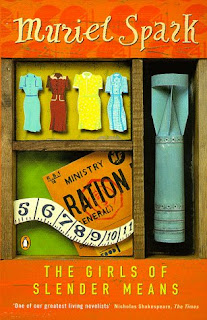The Girls of Slender Means, by Muriel Spark
It's been awhile since I read The Prime of Miss Jean Brodie, so I may be remembering it incorrectly, but it seems that this book, the novel Spark wrote after Brodie, duplicates the basic structure: a death provides the impetus for fairly half-hearted reconnecting and more full-hearted reminiscing (at least on the part of one girl who is rather singled out by her intelligence) among a group of women now dispersed but who shared an intense and formative experience when they were girls together.
This is not a cavil against this novel; it works quite as well as it did in Brodie, and this one's far funnier (or maybe it's just that I'm older). At any rate, I really enjoyed this novel.
Of course, there is a sense that the replication of the plot tilts its basic structure toward the allegorical, a tendency given almost full play in this novel, which begins, charmingly, "Long ago in 1945 all the nice people in England were poor, allowing for exceptions." (Spark is among the best at writing glib statements that are neither superficial nor tart.) And there is a breezy nostalgia to the whole thing, rather like the film Hope and Glory, by John Boorman, though with more sophisticated politics and more sex.
The inclusion of many lines of classic poems (deftly inserted by the device of having one of the girls practicing and instructing others in elocution) furthers this bucolic re-imagining of a time of acute rationing and war-exhaustion; the pull of lines like
I thought of Chatterton, the marvellous Boy,
The sleepless Soul that perished in his pride;
recall the reader to a much earlier England in historical terms, and to a much younger England in terms of character and energy. There is an intentional innocence, and a foolhardy romanticization of mild penury: "He observed that at no point did poverty arrest the vitality of its members but rather nourished it. Poverty differs vastly from want, he thought." Grad students everywhere undoubtedly also know the difference. (Although, like most grad students, the genteel poverty of these young girls differs vastly from all other types of poverty, and Spark is a little too blithe here, I think.)
This is not a cavil against this novel; it works quite as well as it did in Brodie, and this one's far funnier (or maybe it's just that I'm older). At any rate, I really enjoyed this novel.
Of course, there is a sense that the replication of the plot tilts its basic structure toward the allegorical, a tendency given almost full play in this novel, which begins, charmingly, "Long ago in 1945 all the nice people in England were poor, allowing for exceptions." (Spark is among the best at writing glib statements that are neither superficial nor tart.) And there is a breezy nostalgia to the whole thing, rather like the film Hope and Glory, by John Boorman, though with more sophisticated politics and more sex.
The inclusion of many lines of classic poems (deftly inserted by the device of having one of the girls practicing and instructing others in elocution) furthers this bucolic re-imagining of a time of acute rationing and war-exhaustion; the pull of lines like
I thought of Chatterton, the marvellous Boy,
The sleepless Soul that perished in his pride;
recall the reader to a much earlier England in historical terms, and to a much younger England in terms of character and energy. There is an intentional innocence, and a foolhardy romanticization of mild penury: "He observed that at no point did poverty arrest the vitality of its members but rather nourished it. Poverty differs vastly from want, he thought." Grad students everywhere undoubtedly also know the difference. (Although, like most grad students, the genteel poverty of these young girls differs vastly from all other types of poverty, and Spark is a little too blithe here, I think.)

Comments
thanks for sharing
Hannah